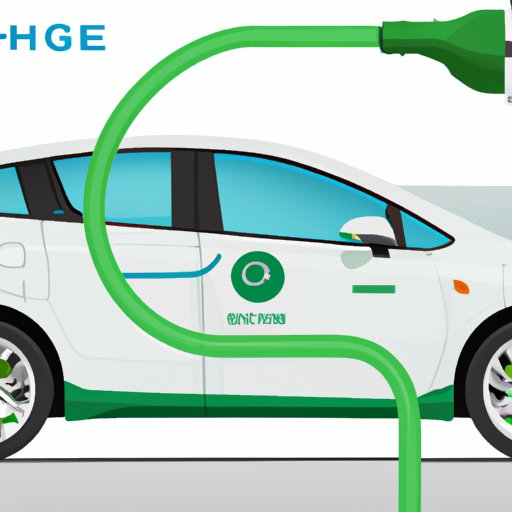Introduction
Electric cars are becoming increasingly popular as more drivers look for an alternative to gasoline-powered vehicles. But if you’re thinking about purchasing an electric car, you may be wondering how long it takes to charge one. This article will explore the range of charging times for electric cars and the various factors that can affect them.
A Guide to Charging Times for Electric Cars
When it comes to electric car charging times, there is a wide range of possibilities. How long it takes to charge your vehicle can vary depending on several factors, including the type of car, the size of its battery, and the type of charger being used. Generally speaking, most electric cars can be charged in anywhere from 30 minutes to 12 hours.
The exact amount of time required to charge your vehicle will depend on the type of charger you use. For example, some electric cars can be charged using a standard 120-volt household outlet, while others require a 240-volt outlet or a dedicated charging station. The type of charger you use will determine the speed at which your car charges.
How Long Does it Take to Fill Up an Electric Vehicle?
The amount of time it takes to fill up an electric vehicle varies depending on the type of car and the size of its battery. For instance, a small electric car with a smaller battery may take less time to fully charge than a larger electric car with a bigger battery. Generally speaking, it can take anywhere from 30 minutes to 12 hours to fully charge an electric car.
In addition, some electric cars come equipped with quick-charging systems that allow you to quickly fill up your vehicle in a shorter amount of time. These systems typically require a special charging station and can reduce charging times to as little as 15 minutes.

Understanding the Basics of Electric Car Charging Times
In order to understand electric car charging times, it’s important to consider two main factors: battery size and type of charger. The size of the battery is important because it determines how much energy can be stored in the battery, which affects how long it takes to charge. In general, the bigger the battery, the longer it will take to charge it.
The type of charger is also important because it determines the speed at which the battery is charged. Standard 120-volt outlets are the slowest, while dedicated charging stations are the fastest. Additionally, alternating current (AC) chargers are slower than direct current (DC) chargers.

Exploring the Pros and Cons of Charging an Electric Car
Charging an electric car has both advantages and disadvantages. On the one hand, electric cars are more efficient than gasoline-powered vehicles, so charging them requires less energy. Additionally, electric car batteries are designed to last for many years, which means they don’t need to be replaced as often as gasoline-powered vehicles.
On the other hand, electric cars require more time to charge than gasoline-powered vehicles. Additionally, charging an electric car can be expensive if you have to install a dedicated charging station in your home. Finally, electric cars require more maintenance than gasoline-powered vehicles, which can increase the cost of ownership.

Comparing Electric Car Charging Times to Other Fuel Sources
When comparing electric car charging times to other fuel sources, it’s important to consider the environmental impact of each. Electric cars emit no emissions, so they are better for the environment than gasoline- or diesel-powered vehicles. Additionally, electric cars are more efficient than gasoline- or diesel-powered vehicles, so they require less energy to run.
However, electric cars require more time to charge than gasoline- or diesel-powered vehicles. Additionally, electric cars are still more expensive to purchase than gasoline- or diesel-powered vehicles. Finally, electric cars require more maintenance than gasoline- or diesel-powered vehicles, which can increase the cost of ownership.
How Much Time is Required to Charge an Electric Car Fully?
The amount of time it takes to charge an electric car fully depends on several factors, including the type of car, the size of its battery, and the type of charger being used. Generally speaking, it can take anywhere from 30 minutes to 12 hours to fully charge an electric car. Quick-charging systems can reduce charging times to as little as 15 minutes.
In order to achieve a full charge, it’s important to use the right charger for your vehicle. For example, some electric cars require a 240-volt outlet or a dedicated charging station in order to achieve a full charge. Additionally, AC chargers are slower than DC chargers, so it’s important to make sure you’re using the right type of charger for your vehicle.
Conclusion
Electric car charging times can vary depending on the type of car, the size of its battery, and the type of charger being used. Generally speaking, it can take anywhere from 30 minutes to 12 hours to fully charge an electric car. Additionally, quick-charging systems can reduce charging times to as little as 15 minutes. When compared to other fuel sources, electric cars are more efficient and better for the environment, but they require more time to charge and more maintenance.
Overall, electric car charging times can vary significantly depending on the type of car, the size of its battery, and the type of charger being used. Understanding these factors can help you make the most of your electric vehicle and ensure that you’re getting the best charging times possible.


